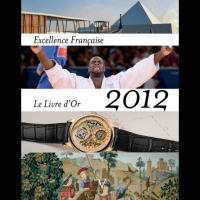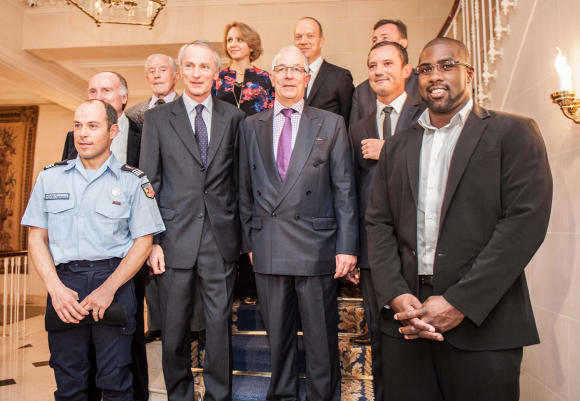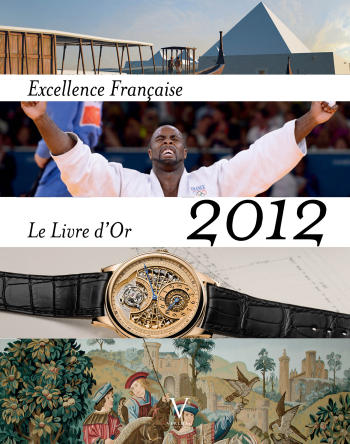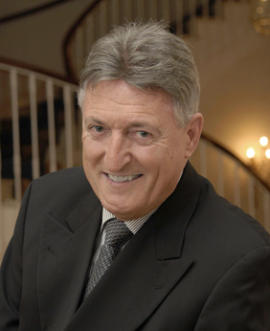
Awards and award ceremonies tell a lot about a country, if not always about the nation that it is then at least about the nation that the award-givers want it to be.
Of the many annual awards ceremonies great and small that take place in Paris each fall, three are examined for the insights they provide into certain visions of French excellence, heritage and savoir-faire or know-how.
Their recipients represent a wide variety of companies, associations and individuals that embody, each in its/his/her own way, a certain vision of France or of a part of France today, of its history and of its ambitions. Theirs may be a glorified image of France, sanitized of the cult of governmental heavy-handedness and the functionary ambitions that dominate major sectors of the culture and the economy, but that image has its own truth, a truth that gives much pleasure to foreign residents, travelers and stay-at-home Francophiles.
The three awards ceremonies go by the headings Excellence Française (French Excellence), Un Patrimoine pour demain (A Heritage for Tomorrow) and Trésors vivants de l’artisant (Living Treasures of Craftsmanship).
Excellence Francaise
Excellence Française brought together a prestigious array of CEOs and leaders in various fields when it hosted its fourth annual namesake awards in the refined setting of the Hotel Bristol in Paris on November 21, 2012.
“Excellence Française,” its founder and president Maurice Tasler has written, “was established to contribute to this optimistic outlook of our beautiful country, and thereby for each and every one of us.” Mr. Tasler points to the 2012 recipients of these awards as “a shining example and source of renewed confidence for all those who are plagued by doubt.”
These domestic awards are given with international intent. Thanks in part to Exellence Française’s partnership with TV5 Monde, an international French-language station, the Excellence Française imprimatur offers companies, often already with a significant international presence, an additional opportunity to showcase their talents and accomplishments abroad. In addition to filming the ceremony itself, TV5 Monde has produced highly flattering videos about each of the winners.
Reflecting the international intent of these awards, French Foreign Minister Laurent Fabius, Mr. Tasler told the assembly at this year’s awards ceremony, had sent a letter of congratulations also regretting that he could not be in attendance that evening.
Despite bringing together men and women with excellence written all over their detailed curricula vitae and despite best wishes from government officials, Mr. Tasler remains mysteriously discreet about his own C.V. More on that later. First, here are the ten members of the Excellence Française class of 2012.

Sector Category—C ompany/Organization—Represented by
1. Technology—Dassault Systèmes—Bernard Charlès, president and CEO.
2. Enology—Wines of Burgundy—Louis-Marc Chevignard, Grand Connétable (head knight) of the Confrérie des Chevaliers du Tastevin, Burgundy’s brotherhood of wine tasters.
3. Education—Agence pour l’Enseignement Français à l’Etranger, AEFE, the government agency for French education abroad—Anne-Marie Descôtes, executive director.
4. Government institutions—PGHM de Chamonix, Peloton de Gendarmerie de Haute Montagne (Chamonix national high mountain rescue team)—Jean-Baptiste Estachy, commander.
5. Craftsmanship—Aubusson Manufactory Robert Four—Robert Four, founding president.
6. Instrument Manufacturing: Pianos Pleyel—Hubert Martigny, CEO.
7. Luxury Watchmaking—L. Leroy—Guillaume Tripet, CEO.
8. Sports—French Judo Federation—Teddy Riner, gold medalist at 2012 London Olympics.
9. Automobile Equipment—Michelin—Jean-Dominique Sénard, CEO.
10. Luxury Silverware—Christophle—Thierry Oriez, CEO.

These aren’t competitive awards; in many ways they are obvious selections. Categories are largely contrived to fit the awardees rather than the other way around. That doesn’t diminish the importance of the companies and organizations themselves but it does raise the question as to what’s truly behind this brand of award-making.
Mr. Tasler says that his ambition for Excellence Française is to “hoist high the colors of France” and to create an economic and cultural “strike force.” Each year’s awardees represent for him “a widening circle of influence.” That’s a slightly ominous phrase to describe the effect of doling out honorary awards, however merited they may be.
The awards ostensibly honor to companies and organization. In being accepted on their chief or most stellar representatives, though, it was evident that many of them, not simply the owner-bosses, were handed and accepted the award as a personal honor. Emphasizing the mano-a-mano nature of Excellence Française, an equally high-level array of representatives from the class of 2011 presented the awards but to fields of activity different from their own, making for entertaining juxtapositions and often witty introductions by those in unrelated fields but of equal “excellence.”
The physical award received by the honored organizations is a handsome bilingual coffee-table book (for sale and also available for iPad) containing Mr. Tasler’s informative interviews with the leading representative of that organization along with illustrations of their products, participants and employees. The book opens with an introduction by Mr. Tasler in which he writes: “Our [France’s] exceptional creativity and capacity for innovation, together with our art of living, should enable us to compete very effectively. France shouldn’t be hesitant about her success.”Sitting in the elegant setting of the Hotel Bristol, aware that the collective C.V. of those in attendance had excellence written all over it and that the bonhomie between the recipients reflected many shared interests, this writer couldn’t help but wonder who outside of government and a James Bond film would have the influence, the financing and the Rolodex to bring together so many CEOs and directors (with an Olympic gold medalist thrown into the mix) for the purpose of receiving rather obvious recognition.

Maurice Tasler is, however, extremely discreet regarding his background, acknowledging only that he has worked in various fields and that his multidisciplinary past allowed him to constitute the well-appointed address book that served as the launch pad for the Excellence Française enterprise. The addresses have expanded admirably over the past few years thanks to the awards and the awardees. Mr. Tasler is not so much self-effacing—indeed, his presence on the podium and his role as interviewer for the Livre d’Or demonstrated otherwise—as he is elusive.
Excellence Française was nevertheless a lovely, well-orchestrated ceremony with good humor, intelligent commentary and diverse acceptance speeches. Champagne would follow. We were all ready for a glass as the closing remarks were graciously made. Everyone applauded.
Then Serge Dassault came to the podium.
Mr. Dassault is publisher of the right-leaning newspaper Le Figaro, a conservative party (UMP) senator from Essonne (the department just south of Paris) since 2004 and head of a major defense contractor. Now it’s no secret that publishers, politicians and CEOs routinely form a well-massaged ménage à trios in France. Exceptionally, though, Mr. Dassault brings together all three in a single man. Imagine if you will U.S. Senator Mitch McConnell holding sway over The Washington Post and Northrop Grumman.
Mr. Dassault gave a nod to the assembled directors and organizers, he re-applauded the namesake company that had won an award and he indicated that this gathering could teach a thing or two to a certain left-wing politician. While it’s true that certain politicians gladly make common cause with the significant part of the electorate that is highly wary of business leaders, employers and private sector success, this was certainly a missed opportunity for a man with a winning hand to stay silent and simply applaud the brotherhood of successful enterprise. Unless of course…
… Unless of course… Contemplating the forces behind these awards, this writer naturally wondered if one of the forces behind the Excellence Française enterprise—perhaps even the main force—was Mr. Dassault himself and if so then the personal or political agenda involved may not be so broadly excellent after all.
Asked subsequently in a private discussion if this was the case, Mr. Tasler said that there is no governmental agency or political agenda behind these prizes but that he could not refuse his distinguished guest’s request to speak.
Mr. Tasler then spoke about plans for 2013, when he intends to begin expanding Excellence Française beyond the selection of award recipients and the ceremony itself by organizing round-table discussions, private gatherings among awardees and, possibly with the assistance of the Foreign Ministry, trips abroad to promote the French brand(s) of excellence. Mr. Tasler insists that even if the goal of promoting French industry and excellence internationally is also in the State’s interest, Excellence Française is not and does not intend to be an arm of the government.
Mr. Dassault’s graceless endnote deserves mention because it was so remarkably out of tune with the rest of the ceremony, and Mr. Tasler’s elusiveness regarding his own background also deserves mention because it adds a slight discomfort to the overall applause of his initiative. Nevertheless, a largely dignified and entertaining evening presented ten great examples of French excellence that do indeed deserve attention abroad.
© 2012, Gary Lee Kraut
Go to Part 2 of Paris Award Ceremonies Honor French Excellence, Heritage and Savoir-Faire.

